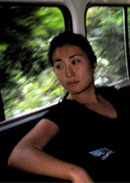Sun Lee (2007)
East Timorese Testimonial Narratives Identification and Reconciliation after Mass Atrocity
Sun Lees project inquired into the mind of the East Timorese asking their opinions on the state of justice in their country regarding the events of 1999, when the Indonesian military inflicted mass violence upon Timorese civilians as they voted to become independent from Indonesia. The UN established a Special Crimes Panel in order to investigate the events, and a national truth and reconciliation commission (CAVR) worked hard to produce a massive report documenting the events. But the thoughts of the Timorese themselves were never solicited in full. Sun investigated how ideas of justice differed for the Timorese in comparison with international opinion and also among Timorese from various backgrounds. Documenting these voices in the form of personal accounts was the primary objective of the fieldwork period, which resulted in the production of hours of digital video. The editing process will produce a twofold final product: a collection of interviews to go into the archive and a more artistic interpretation of the current situation in the form of a short film.
Letters Home
Biography
Sun Lee is a scholar-activist-artist who spent the last few years of her undergraduate career focusing on human rights issues as they relate to postcoloniality and modernity. Specifically, she has applied her interest to post-conflict/colonial societies engagement with war crimes, considering the victimization of large numbers of civilians as a product of modern warfare. Although concerned about the future and implementation of international criminal law, her fieldwork in countries such as Rwanda, Cambodia and East Timor has deviated from a purely legal or analytical approach. While her work is always grounded in theory, her approach is distinctly interdisciplinary and wide reaching. In Rwanda she focused on the community justice process called gacaca created to address the perpetrators of the Rwandan genocide of 1994; in Cambodia she worked with local NGOs in devising strategies for the newly established hybrid court Extraordinary Chambers in the Court Criminal Court for Cambodia.
The Stronach project took her to East Timor where she recorded peoples opinions and hopes for the establishment of justice for the Indonesian crimes of 1975-99. The production of a film depicting the voices of justice in East Timor will serve as a segue into the field of art and visual studies, as she pursues her passion to use art as a medium for social change.
